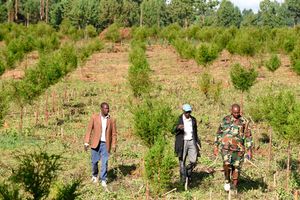Thousands of families to benefit from Kaptagat forest conservation project

Geoffrey Kigen carries a calf during distribution of 10 improved heifers under the Kaptagat Restoration and Livelihood Improvement Programme at Kiptulos Secondary School in Keiyo South, Elgeyo Marakwet County on December 30, 2024.
What you need to know:
- The programme seeks to reduce residents' reliance on forest resources by providing alternative, sustainable means of earning a livelihood.
More than 28,000 households neighbouring Kaptagat Forest in Elgeyo Marakwet County are set to benefit from a transformative livelihood improvement project aimed at conserving the vital water tower while improving local incomes.
The 10-year project, supported by the World Wide Fund for Nature (WWF) and other partners, seeks to reduce residents' reliance on forest resources by providing alternative, sustainable means of earning a livelihood.
The programme will introduce improved livestock breeds such as high-yield dairy cows, and distribute seedlings of cash crops including avocados, coffee and tea.
Speaking at Kiptulos Secondary School in Keiyo South during the distribution of dairy cows to 10 beneficiaries, Treasury Principal Secretary Chris Kiptoo, who serves as the project’s patron, emphasised the partnership's goal of encouraging sustainable farming practices.
"We want residents to reduce their herds and at the same time increase their income. The cows that we are distributing today are high-yielding breeds producing up to 30 liters of milk per day, compared to the average of five liters per day produced by the indigenous breeds kept by most farmers," said Dr Kiptoo.
One of the beneficiaries, Godfrey Kigen, expressed gratitude for the initiative. " My cow gave birth two days ago. I have been told that it will be producing about 20 litres per day for a start before gradually improving," Mr Kigen said.
The exotic dairy breeds provided are ideal for zero-grazing methods, which will help reduce the herding activities within the forest. This, in turn, is expected to curb the destruction of young trees.
“This will encourage a circular economy, where waste from the animals can be used to create biogas. The move will also reduce the demand for wood and hence support conservation efforts,” Dr Kiptoo noted.
The Kaptagat ecosystem comprises five forest blocks—Kessup, Kaptagat, Sabor, Kipkabus, and Penon—all of which are part of the larger Kaptagat water tower.
In addition to promoting dairy farming, the project is encouraging residents to embrace cash crop farming such as tea, avocados, and coffee so they can tap into lucrative local and international markets.
“We are encouraging farmers to adopt cash crop farming so they can take advantage of the many markets available locally and abroad,” said Dr Kiptoo.
Under the programme, over 100,000 tea seedlings have already been distributed to farmers in the region to facilitate the shift to high-value crops.
“We will help the farmers around the forest and those in the highland areas embrace tea and coffee farming, among other crops. All these efforts aim to transform and improve household incomes in the region,” he added.
Elgeyo Marakwet County Government has pledged to support residents with comprehensive agricultural extension services to ease the transition to modern farming methods.
"This programme will change the fortunes of this community forever. We will support them right from the production stage through extension services up to accessing markets for their produce, be it milk or coffee, through their respective cooperatives. We want our people to transition from dependency to self-reliance," said Governor Wisley Korir.
Dr Kiptoo, who previously served as Environment PS, has been leading conservation efforts in the Kaptagat region for several years. These efforts include extensive tree-planting activities and sensitiSing residents about environmental conservation.
"The conservation efforts spearheaded by the PS have so far helped to recover vast areas of the forest that had been degraded by human activities, " Governor Korir noted.
Elgeyo Marakwet, which boasts two crucial water towers in Kenya; Kaptagat and Cheregany, was at one point ranked the second largest forest cover in the country with 37 per cent cover, which has declined to 29 per cent over the years.
According to the Kenya Forest Service, Kaptagat ecosystem was severely affected, with the 30,000 hectares of indigenous forest cover reduced by over 35 per cent in slighlty over two decades since early 2000s.





